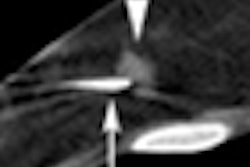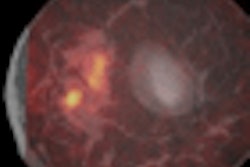Many radiologists said they might not tell a patient if they made a mistake when reading mammograms that resulted in a delayed cancer diagnosis, according to a study published online in Radiology (August 25, 2009).
Interestingly, the researchers found that fear of malpractice did not appear to be related to radiologists' reluctance to discuss errors with patients. Instead, the results hinted that other factors could be related to their reticence, according to the study by lead author Dr. Thomas Gallagher of the University of Washington School of Medicine in Seattle and colleagues.
The group conducted a survey of 364 radiologists who interpreted mammograms at seven sites in the U.S. National Cancer Institute's Breast Cancer Surveillance Consortium (BCSC) between 2005 and 2006.
Participants received a vignette in which comparison screening mammograms were placed in the wrong order, leading a radiologist to conclude calcifications were decreasing in number when they were actually increasing. Each radiologist was asked how likely they would be to disclose this error to a patient, what information they would share, and their malpractice attitudes and experiences.
Survey data were collected between January 2006 and September 2007; sites were located in Colorado, North Carolina, New Hampshire, Washington, California, New Mexico, and Vermont. Sixty-seven percent (243 of 364) of the radiologists who participated in the survey responded to the disclosure vignette questions. Responses to the question of whether or not they would disclose the error included:
- Definitely not: 9%
- Only if asked by the patient: 51%
- Probably: 26%
- Definitely: 14%
In addition, 24% responded that they would "not say anything further to the patient"; 31% would tell the patient that the "calcifications were larger and are now suspicious for cancer"; 30% would tell the patient that "the calcifications may have increased on your last mammogram, but their appearance was not as worrisome as it is now"; and 15% would explicitly say that "an error occurred during the interpretation of your last mammogram, and the calcifications had actually increased in number, not decreased."
Respondents also showed a bias in favor of talking to the patient about good news, but not about negative results. Some 76% reported that they "often" or "always" talked with patients about positive mammography results, while only 46% said they often or always talked with patients about negative findings.
Radiologists with 10 to 19 years of experience interpreting mammograms were less likely to disclose the hypothetical error to the patient than radiologists with less and with more experience, according to the study. Gallagher attributed this finding to the fact that younger radiologists may be more likely to have received formal disclosure training, and senior radiologists may have more comfort with disclosure due to accumulated personal experience.
The reluctance to disclose medical errors is not necessarily motivated by self-protection, Gallagher told AuntMinnie.com. The study found no relationship between respondents' attitudes and experiences related to malpractice and their willingness to disclose errors: Respondents who said they thought their likelihood of being sued for malpractice in the next five years was higher than 50% were actually more likely to say they would be willing to disclose an error, compared with radiologists who had a lower expectation of being sued.
Communication breakdown?
The researchers speculated that the unwillingness of radiologists to be the bearers of bad tidings might actually be more related to their communication skills than their sense of self-preservation.
"It's assumed that when doctors don't tell their patients about errors, it's a failure of character," he said. "But actually, it's more a failure of communication skills, particularly for radiologists, who don't have a lot of direct interaction with patients. And doctors wonder whether telling the patient about the error will really help."
According to other research, however, patients want to hear about any harmful error in their care, even if the information is upsetting, according to Gallagher.
"Across the board, patients value honesty and openness," he said. "It doesn't mean they don't get angry about [these kinds of errors], but even when they're upset about what happened, the trusting aspect of the patient-provider relationship remains intact and patients can go forward in care. And the reverse is true -- if a patient isn't told about an error, it destroys the trust in that relationship."
The movement toward greater openness with patients following errors is gaining momentum, yet effective disclosure remains the exception, not the rule, particularly for radiologists, the study showed.
"Radiologists are in an awkward position in these kinds of situations, and the long-term goal is to develop strategies to help them handle them effectively," Gallagher said.
By Kate Madden Yee
AuntMinnie.com staff writer
September 2, 2009
Related Reading
ACR urges Obama to address malpractice reform, August 14, 2009
Web site solicits patients for cases of radiology errors, May 27, 2008
Copyright © 2009 AuntMinnie.com




















